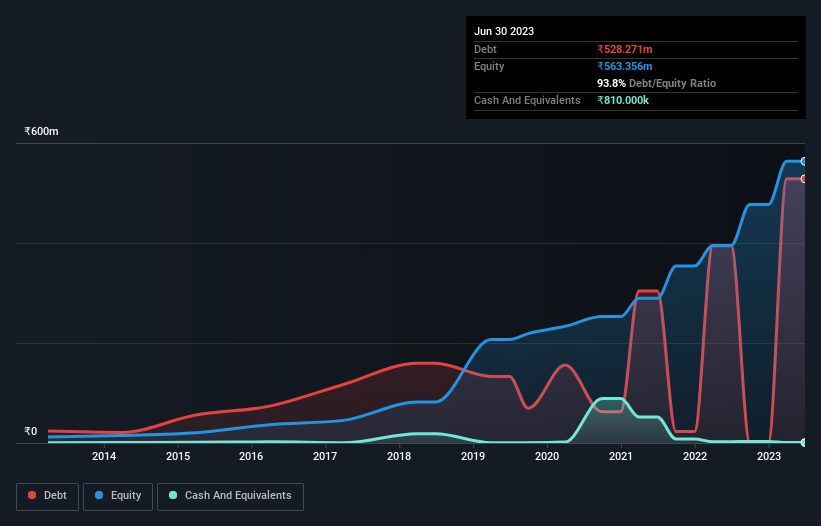Does Bombay Super Hybrid Seeds (NSE:BSHSL) Have A Healthy Balance Sheet?

Warren Buffett famously said, 'Volatility is far from synonymous with risk.' It's only natural to consider a company's balance sheet when you examine how risky it is, since debt is often involved when a business collapses. We note that Bombay Super Hybrid Seeds Limited (NSE:BSHSL) does have debt on its balance sheet. But should shareholders be worried about its use of debt?
What Risk Does Debt Bring?
Debt is a tool to help businesses grow, but if a business is incapable of paying off its lenders, then it exists at their mercy. Part and parcel of capitalism is the process of 'creative destruction' where failed businesses are mercilessly liquidated by their bankers. While that is not too common, we often do see indebted companies permanently diluting shareholders because lenders force them to raise capital at a distressed price. Of course, the upside of debt is that it often represents cheap capital, especially when it replaces dilution in a company with the ability to reinvest at high rates of return. When we think about a company's use of debt, we first look at cash and debt together.
View our latest analysis for Bombay Super Hybrid Seeds
What Is Bombay Super Hybrid Seeds's Debt?
As you can see below, at the end of March 2023, Bombay Super Hybrid Seeds had ₹528.3m of debt, up from ₹394.7m a year ago. Click the image for more detail. And it doesn't have much cash, so its net debt is about the same.

How Strong Is Bombay Super Hybrid Seeds' Balance Sheet?
The latest balance sheet data shows that Bombay Super Hybrid Seeds had liabilities of ₹742.5m due within a year, and liabilities of ₹22.9m falling due after that. Offsetting this, it had ₹810.0k in cash and ₹88.6m in receivables that were due within 12 months. So it has liabilities totalling ₹676.0m more than its cash and near-term receivables, combined.
Given Bombay Super Hybrid Seeds has a market capitalization of ₹24.1b, it's hard to believe these liabilities pose much threat. Having said that, it's clear that we should continue to monitor its balance sheet, lest it change for the worse.
We use two main ratios to inform us about debt levels relative to earnings. The first is net debt divided by earnings before interest, tax, depreciation, and amortization (EBITDA), while the second is how many times its earnings before interest and tax (EBIT) covers its interest expense (or its interest cover, for short). This way, we consider both the absolute quantum of the debt, as well as the interest rates paid on it.
Bombay Super Hybrid Seeds has net debt worth 2.1 times EBITDA, which isn't too much, but its interest cover looks a bit on the low side, with EBIT at only 6.8 times the interest expense. While that doesn't worry us too much, it does suggest the interest payments are somewhat of a burden. Importantly, Bombay Super Hybrid Seeds grew its EBIT by 64% over the last twelve months, and that growth will make it easier to handle its debt. The balance sheet is clearly the area to focus on when you are analysing debt. But it is Bombay Super Hybrid Seeds's earnings that will influence how the balance sheet holds up in the future. So if you're keen to discover more about its earnings, it might be worth checking out this graph of its long term earnings trend.
Finally, a company can only pay off debt with cold hard cash, not accounting profits. So we clearly need to look at whether that EBIT is leading to corresponding free cash flow. During the last three years, Bombay Super Hybrid Seeds burned a lot of cash. While that may be a result of expenditure for growth, it does make the debt far more risky.
Our View
Bombay Super Hybrid Seeds's conversion of EBIT to free cash flow was a real negative on this analysis, although the other factors we considered were considerably better. In particular, we are dazzled with its EBIT growth rate. When we consider all the elements mentioned above, it seems to us that Bombay Super Hybrid Seeds is managing its debt quite well. But a word of caution: we think debt levels are high enough to justify ongoing monitoring. The balance sheet is clearly the area to focus on when you are analysing debt. However, not all investment risk resides within the balance sheet - far from it. For example - Bombay Super Hybrid Seeds has 1 warning sign we think you should be aware of.
When all is said and done, sometimes its easier to focus on companies that don't even need debt. Readers can access a list of growth stocks with zero net debt 100% free, right now.
Valuation is complex, but we're here to simplify it.
Discover if Bombay Super Hybrid Seeds might be undervalued or overvalued with our detailed analysis, featuring fair value estimates, potential risks, dividends, insider trades, and its financial condition.
Access Free AnalysisHave feedback on this article? Concerned about the content? Get in touch with us directly. Alternatively, email editorial-team (at) simplywallst.com.
This article by Simply Wall St is general in nature. We provide commentary based on historical data and analyst forecasts only using an unbiased methodology and our articles are not intended to be financial advice. It does not constitute a recommendation to buy or sell any stock, and does not take account of your objectives, or your financial situation. We aim to bring you long-term focused analysis driven by fundamental data. Note that our analysis may not factor in the latest price-sensitive company announcements or qualitative material. Simply Wall St has no position in any stocks mentioned.
About NSEI:BSHSL
Bombay Super Hybrid Seeds
Engages in the research, production, processing, and marketing of hybrid and GM seeds in India.
Excellent balance sheet with proven track record.
Similar Companies
Market Insights
Community Narratives



